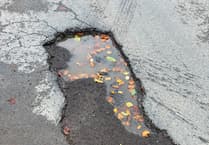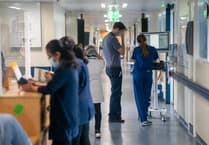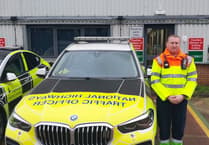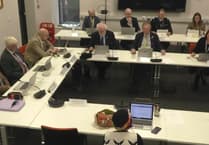EAST?Hampshire MP?Damian Hinds has visited Alton College to talk to students about today’s EU referendum.
He was greeted last Wednesday by a room full of enthusiastic students and teachers, eager to hear what their local MP had to say about the key vote.
Mr Hinds made some pertinent opening remarks, setting out his place in the ‘Remain’ campaign and expressed his pleasure at such a large audience, saying: “You have more invested in this vote and have more to lose in not showing interest in the proceedings than your parents or grandparents, so I am really pleased to see so many of you showing interest in your future.”
The Exchequer Secretary to the Treasury went on to outline his opinion that the UK is better off staying in the EU and that “we can achieve more in the EU than we can alone”.
He covered points about the environment, crime, terrorism and the economic benefit of remaining in the EU and the trade without barriers and tariffs that we currently enjoy.
Following his short opening statement, Mr Hinds took questions from members of the Alton College Students’ Union and from the floor. Questions covered several of the main talking points in both the Leave and Remain campaigns, including immigration, jobs, trade and industry, workers’ rights, the housing market, education and travel and freedom of movement.
The discussion opened with a question about how we can control immigration into the UK, which Mr Hinds answered by saying it is “extremely difficult to control as there is more immigration from outside the EU than from inside, so leaving would not eradicate immigration”.
He mentioned that there are lots of different reasons for people wanting to come to the UK, including family reunions (reuniting children who have come to the UK to escape conflict with their parents and siblings) which is difficult not to agree with morally. He also said there were lots of international students studying in the UK, including at Alton College, which creates cultural diversity and integration, and also brings in more money to the country as their fees are higher.
People also want to come to the UK to work, he said.
Mr Hinds said: “Since May 2010, two million jobs have been created in the UK – that is more than in all of the 27 other EU countries combined. There has also been a decrease in unemployment since that date.”
The statement of these facts raised a question from the floor: “If we are able to create that many jobs in the UK on our own, aren’t we better off without the EU?”
Mr Hinds replied to say that the UK had created those jobs while in the EU so it can continue to create those jobs while remaining in the EU, and that other member countries had created jobs for UK nationals abroad. If we leave the EU, jobs abroad would be more difficult to come by and secure.
Samuel Cornelius-Light, previously at Treloar College, asked: “Do you think there are any benefits of leaving the EU?”
Mr Hinds replied by saying: “Yes, just one thing – not being told what you can and can’t do by Brussels.”
He went on to elucidate his reply by saying that although it is sometimes frustrating being told what you can and can’t do, at least you know that all the other member states are being told the same thing, so our companies and trade agreements are protected and the free market and European directives help to protect us and will help people to succeed and the UK economy to grow in the long run.
There were several political questions, including: “Do you think David Cameron made a mistake in bringing the issue to the public vote?” and “If we leave the EU would a General Election be called and should Cameron step down?”
To the first question, Mr Hinds replied: “We live in a democracy so the people should decide their future. Once it is done and the people have spoken we then move forward. The debate has split parties and irrespective of who was in power, I think this referendum was an inevitability.”
To the second question he said: “If there is a majority exit vote there will be instability in the country and all political parties will need to unite to bring the country back on an even keel and I don’t think a General Election would be beneficial.”
Mr Hinds then turned the table, and asked the students: “What can we as politicians do for you as the voters to make the referendum clearer?”
The students were clear on their replies – keep the electorate more informed with facts; use more straightforward language and less jargon; less speculation; less scaremongering; more positivity, at the moment everything is focussed on the negatives on both sides; what are the benefits rather than ‘what will go wrong’.
Meg Crawford, previously at The Petersfield School, said that often voters don’t know what the current benefits of being in the EU are, so they don’t know what we might lose if we leave. Mr Hinds said it was a good point that he would take away with him for further thought and discussion.
The session finished with Mr Hinds urging those who were able to vote to do so. He said: “Those who can vote, either way, please make sure you do. Your vote counts and it affects your future.”
He then went on to say: “Those who aren’t yet old enough to vote, you can still impact the outcome by speaking to your parents and grandparents about how it will affect you, and urge them to vote. Or you can join a political party and help with their campaign.”





Comments
This article has no comments yet. Be the first to leave a comment.